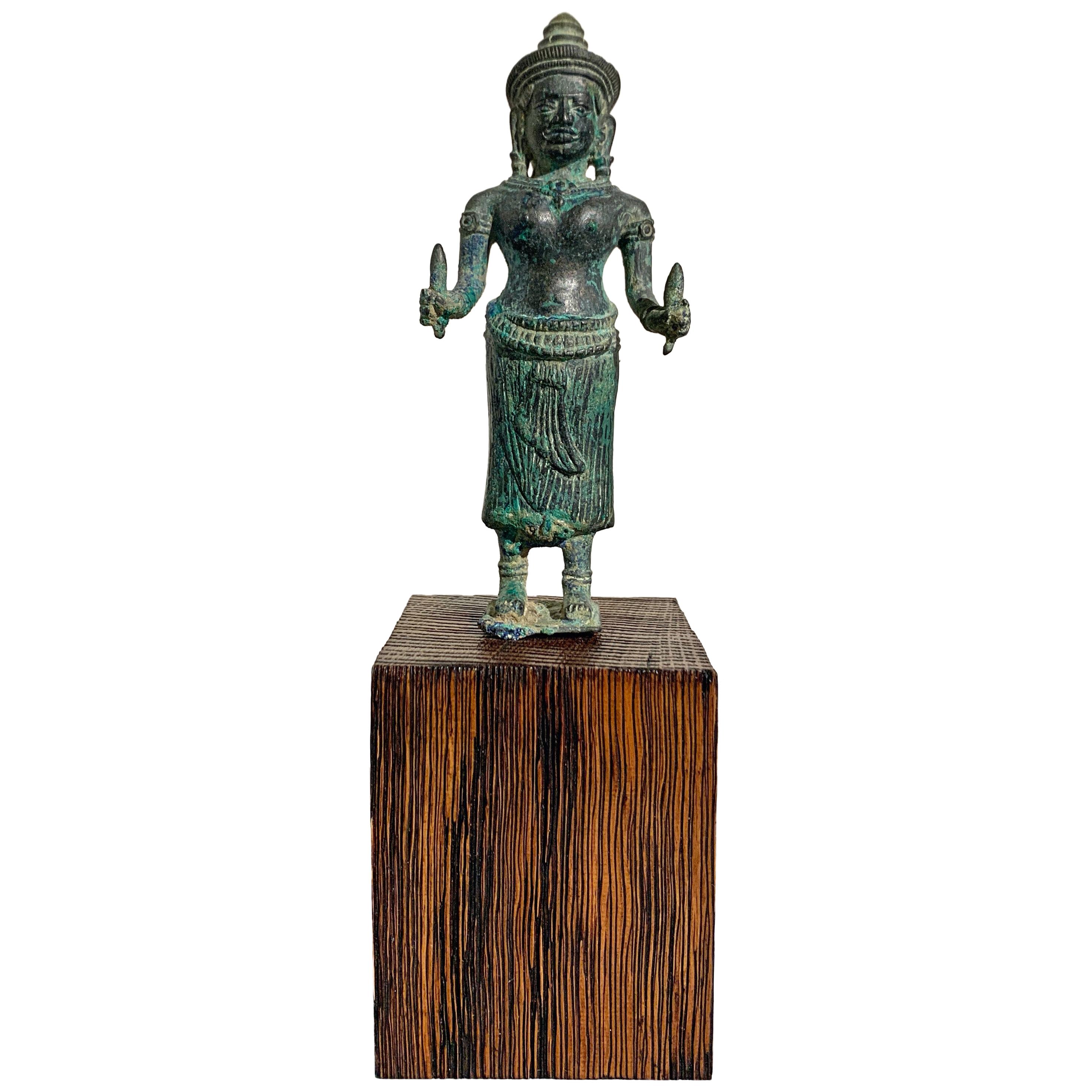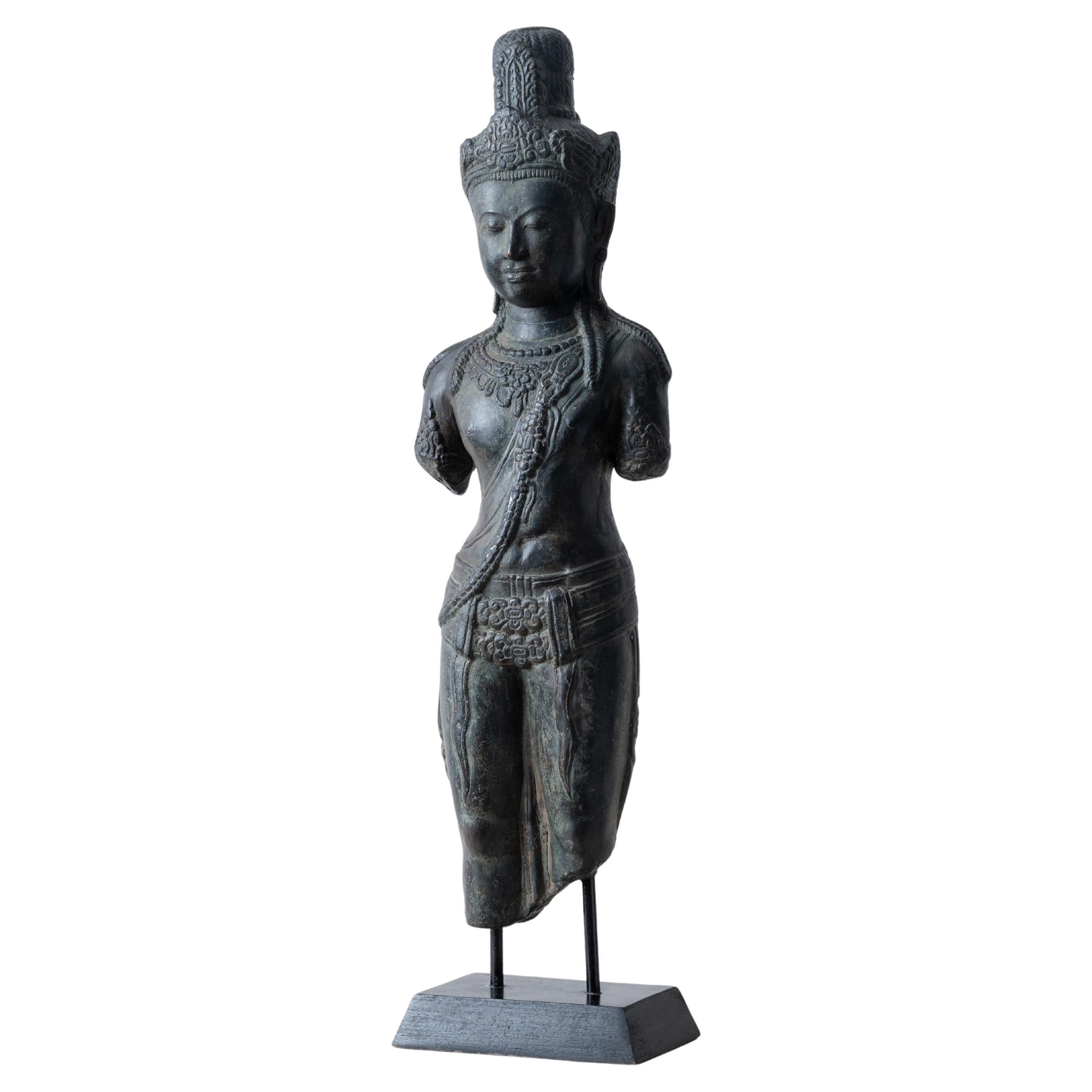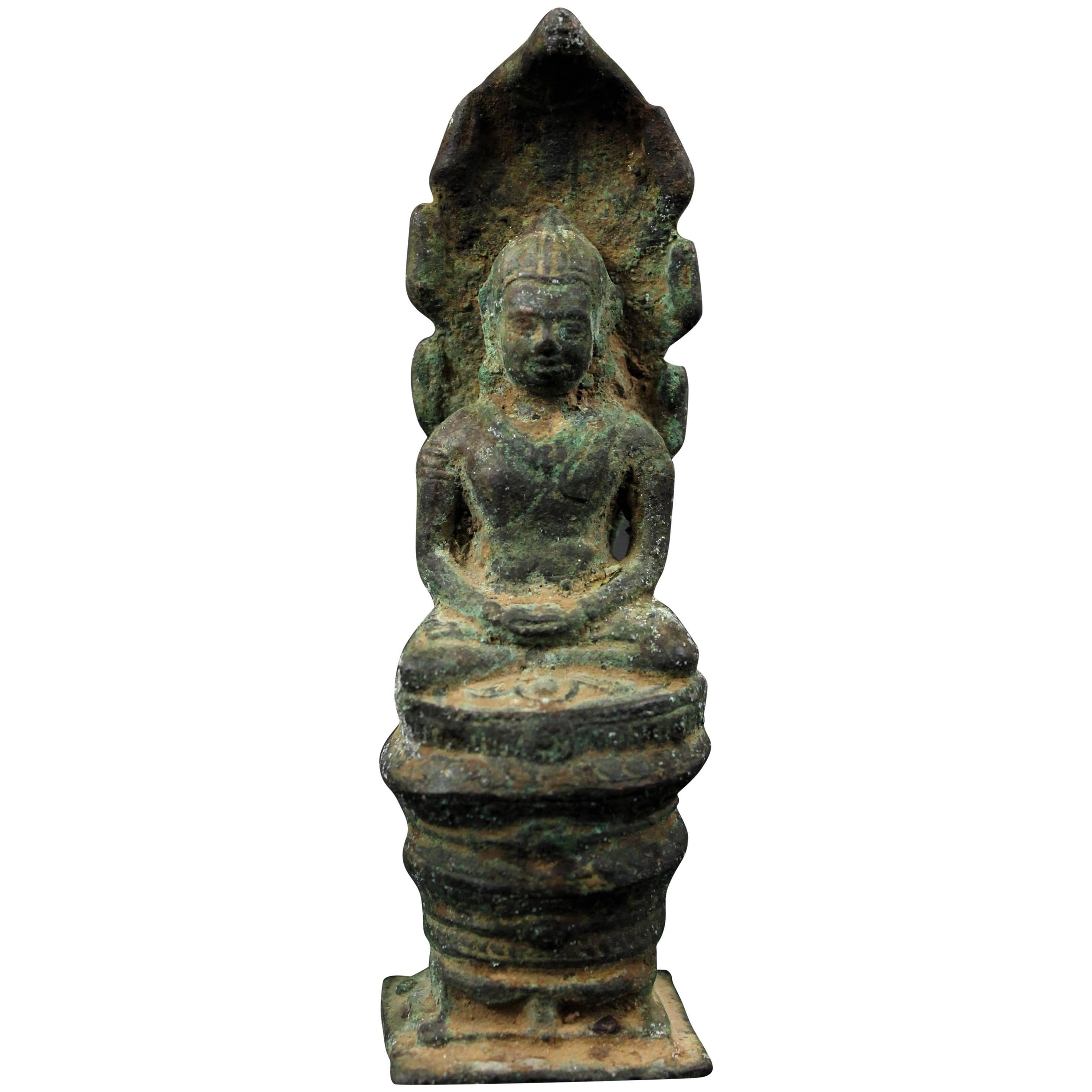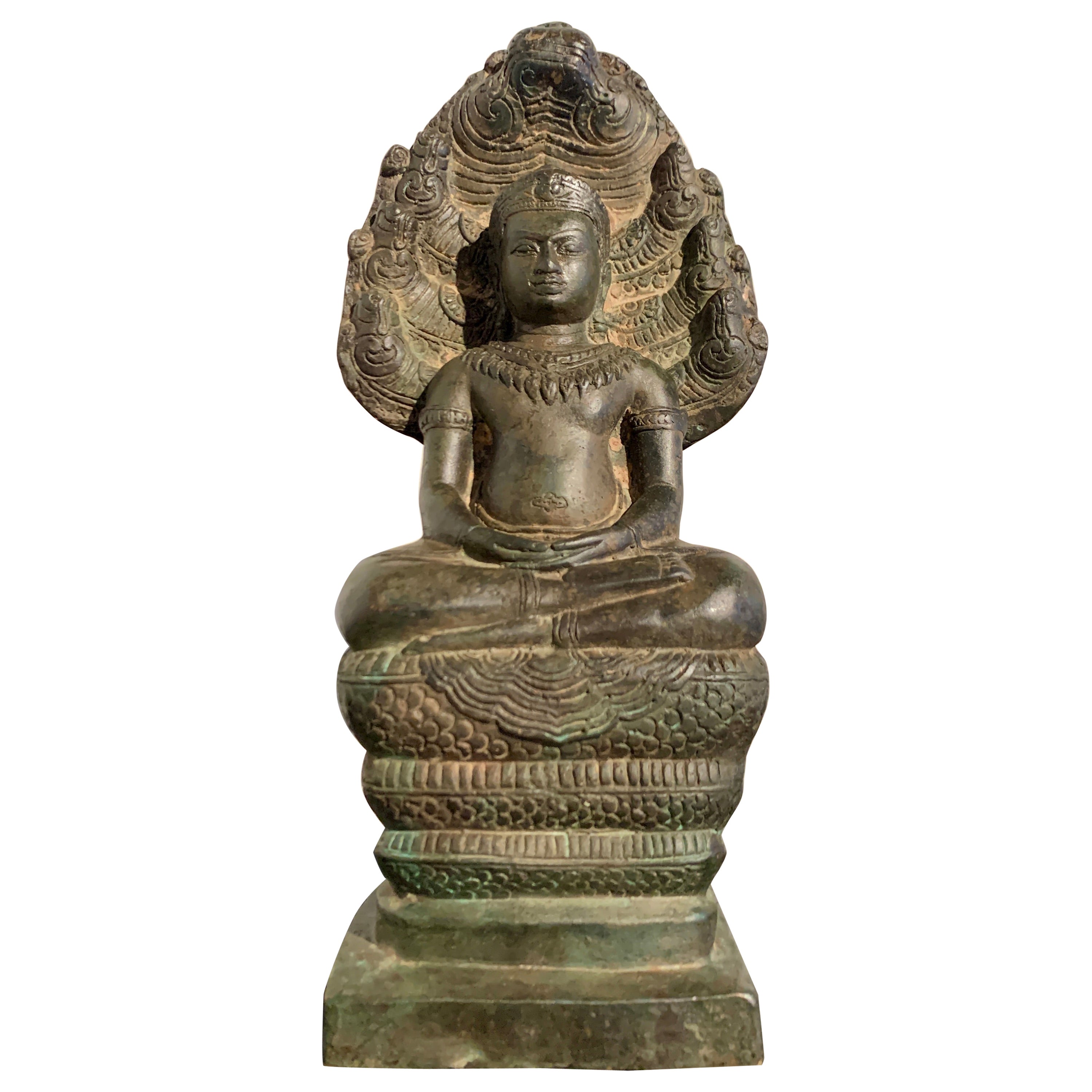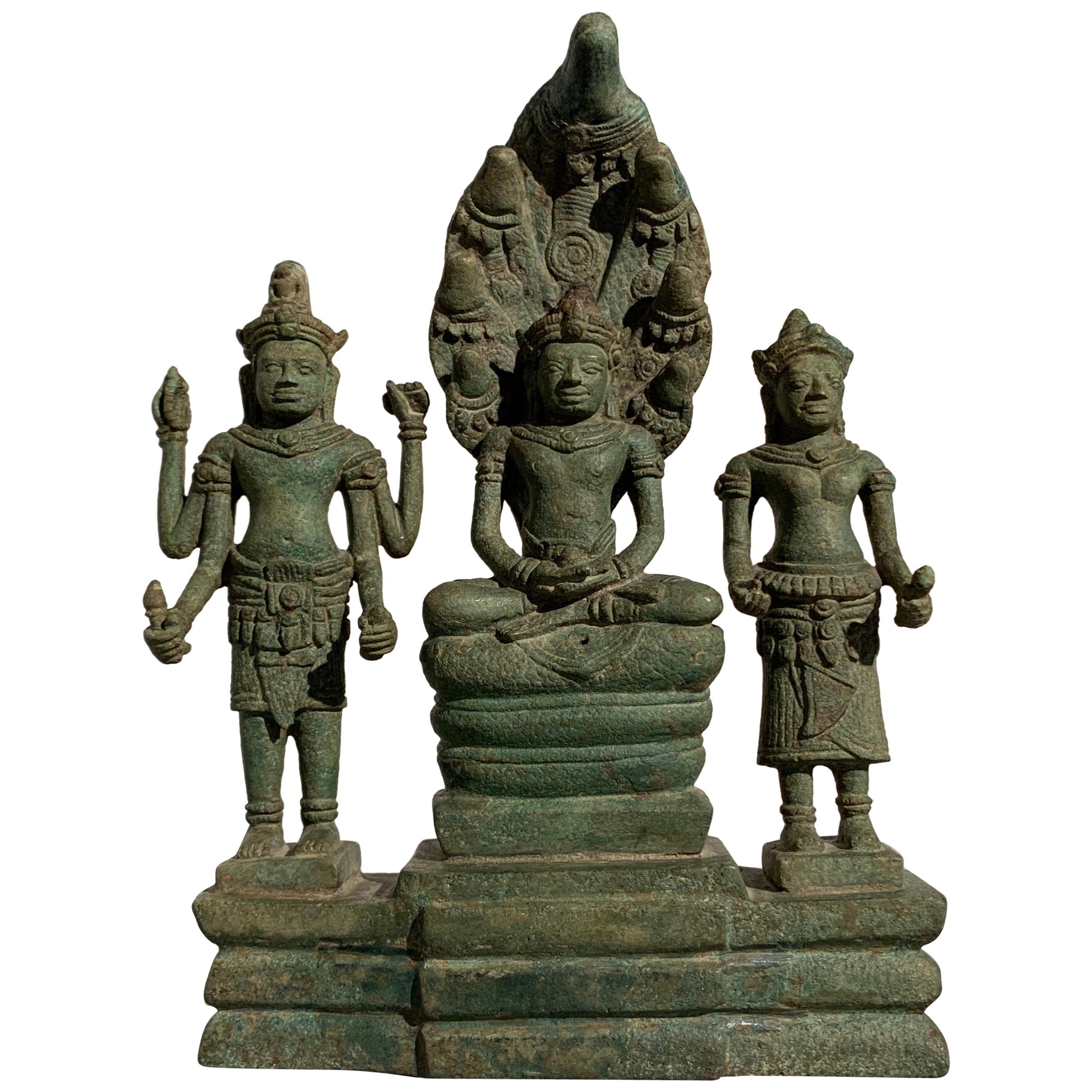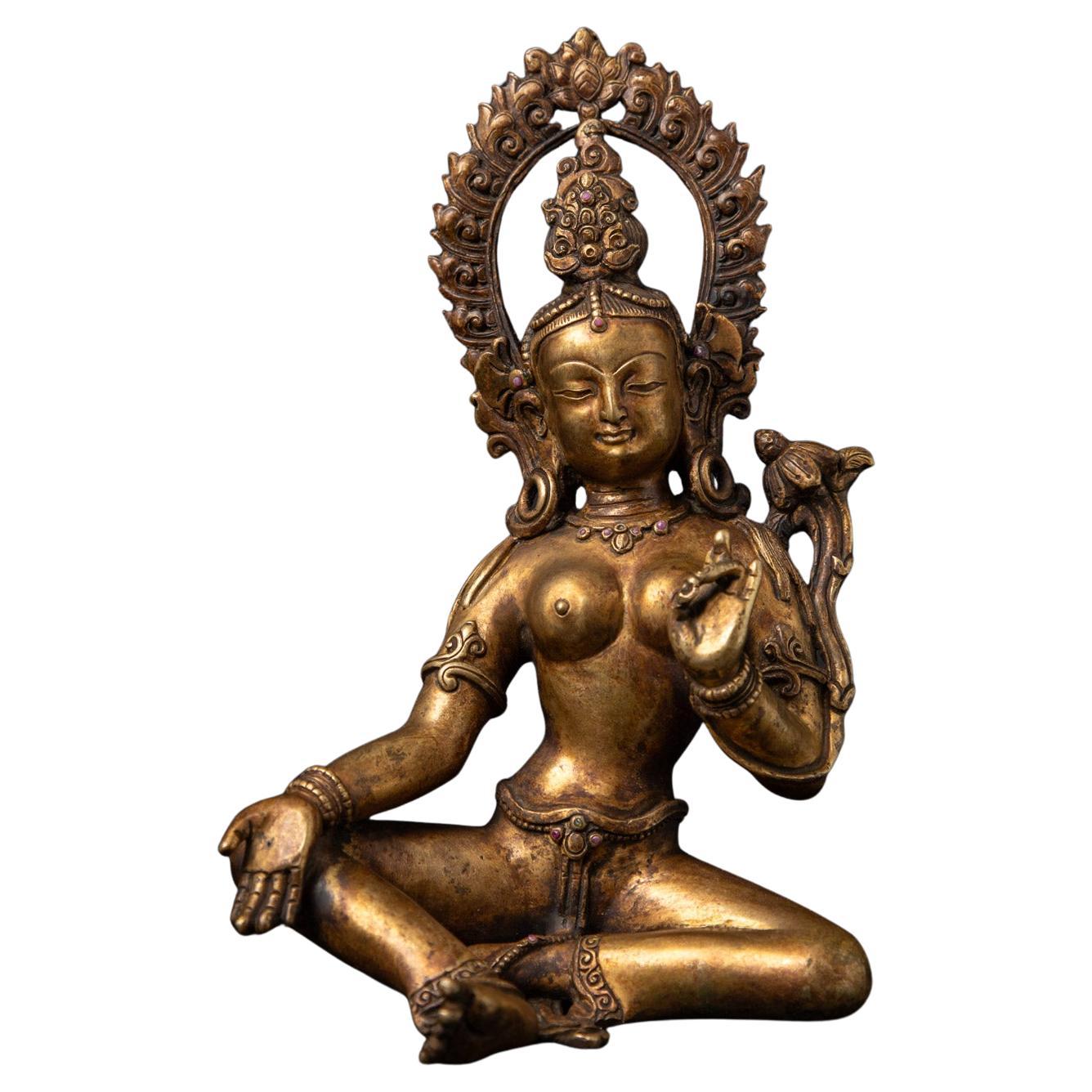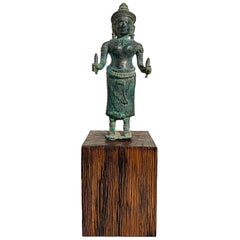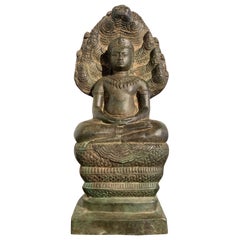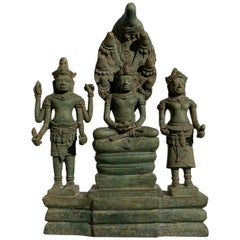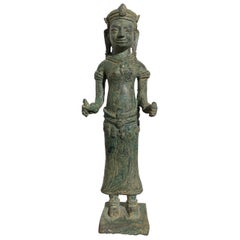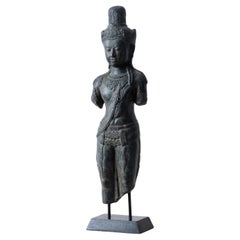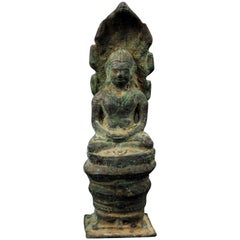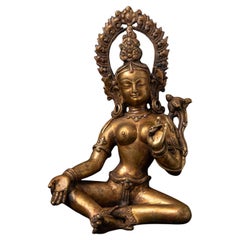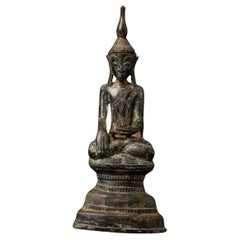Items Similar to Khmer Bronze Figure of Prajnaparamita with Eleven Faces
Want more images or videos?
Request additional images or videos from the seller
1 of 10
Khmer Bronze Figure of Prajnaparamita with Eleven Faces
$85,000
£64,147.16
€73,438.80
CA$119,878.18
A$131,611.29
CHF 68,661.89
MX$1,592,679.87
NOK 860,570.24
SEK 810,883.43
DKK 548,201.07
About the Item
The embodiment of transcendental wisdom, Prajnaparamita is often referred to as the mother of all Buddhas.
In this extremely rare tantric form, she is portrayed seated in the half lotus position. Her eleven faces are arranged in two tiers (seven on the first, with an additional four above), all surmounted by a rising conical chignon. Each face has an associated pair of arms which radiate outwards, each hand holding a discreet attribute.
Careful attention has been paid to her clothing and jewelry. She wears a heavily pleated sampot with a cross hatch pattern, elegantly turned down at the waist and tied with an ornate belt featuring pendants shaped like mango leaves. Each face is adorned with lotus bud pendant earrings and crowned with a diadem. A pectoral graces her naked torso, resting gently between her breasts.
This statues features an overall milky green patina.
For a similar example, see the one in the National Museum of Cambodia, and illustrated in the book "Sculpture of Angkor and Ancient Cambodia, Millenium of Glory" (no. 104).
- Dimensions:Height: 8.25 in (20.96 cm)Width: 9 in (22.86 cm)Depth: 4 in (10.16 cm)
- Materials and Techniques:Bronze,Cast
- Place of Origin:Cambodia
- Period:
- Date of Manufacture:Late 12th Century
- Condition:Wear consistent with age and use. One set of arms slightly loose, but stable.
- Seller Location:Austin, TX
- Reference Number:1stDibs: U110126894794
About the Seller
5.0
Gold Seller
Premium sellers maintaining a 4.3+ rating and 24-hour response times
Established in 2001
1stDibs seller since 2010
348 sales on 1stDibs
Typical response time: <1 hour
- ShippingRetrieving quote...Shipping from: Austin, TX
- Return Policy
Authenticity Guarantee
In the unlikely event there’s an issue with an item’s authenticity, contact us within 1 year for a full refund. DetailsMoney-Back Guarantee
If your item is not as described, is damaged in transit, or does not arrive, contact us within 7 days for a full refund. Details24-Hour Cancellation
You have a 24-hour grace period in which to reconsider your purchase, with no questions asked.Vetted Professional Sellers
Our world-class sellers must adhere to strict standards for service and quality, maintaining the integrity of our listings.Price-Match Guarantee
If you find that a seller listed the same item for a lower price elsewhere, we’ll match it.Trusted Global Delivery
Our best-in-class carrier network provides specialized shipping options worldwide, including custom delivery.More From This Seller
View AllKhmer Bronze Uma, Angkor Wat Style, 12th Century, Cambodia
Located in Austin, TX
A small Khmer bronze figure of the Hindu goddess Uma, Angkor Period, Style of Angkor Wat, circa 12th century, Cambodia.
This small Khmer bronze devotiona...
Category
Antique 15th Century and Earlier Cambodian Sculptures and Carvings
Materials
Bronze
Khmer Cast Bronze Buddha Sheltered by Naga, 19th Century, Cambodia
Located in Austin, TX
A well cast Khmer style bronze figure of an adorned Buddha sheltered by a Naga, Buddha Muchalinda, 19th century or earlier, Cambodia.
The sculpture in th...
Category
Antique 19th Century Cambodian Sculptures and Carvings
Materials
Bronze
Khmer Bronze Buddhist Triad, Style of the Bayon, 12th-13th Century, Cambodia
Located in Austin, TX
An important Khmer bronze Buddhist triad group featuring an image of the Buddha sheltered by a naga, and flanked by the bodhisattvas Avalokiteshvara and Prajnaparamita, Angkor Period, Style of the Bayon, late 12th-early 13th century, Cambodia.
This triad represents one of the most important images in Khmer art...
Category
Antique 15th Century and Earlier Cambodian Sculptures and Carvings
Materials
Bronze
Lopburi Style Cast Bronze Figure of Uma, 13th-14th Century, Thailand
Located in Austin, TX
A charming and unusual cast bronze figure of the Hindu goddess Uma, Lopburi Style, 13th-14th century, Thailand.
Uma, the Hindu goddess of love and beauty, also known as Parvati, i...
Category
Antique 15th Century and Earlier Thai Sculptures and Carvings
Materials
Bronze
Thai Bronze Buddha, Phra Phuttha Chinnarat, Early 20th century, Thailand
Located in Austin, TX
A well cast smaller scale bronze reproduction of the famous golden Buddha known as Para Puttha Chinnarat, housed at Wat Phra Si Rattana Mahathat, mid 20th century, Thailand.
A faith...
Category
Vintage 1920s Thai Sculptures and Carvings
Materials
Bronze
Khmer Bayon Bronze Garuda on Naga Finial, 12th/14th Century, Cambodia
Located in Austin, TX
A large and impressive Khmer cast bronze finial or standard featuring a fantastic image of Garuda atop Naga, Angkor Period, Style of the Bayon, 12th to 14th century, Cambodia.
The t...
Category
Antique 15th Century and Earlier Cambodian Antiquities
Materials
Bronze
You May Also Like
Cambodian Khmer Bronze Figure
Located in Savannah, GA
A Cambodian Khmer bronze fragmentary figure in the manner of the art of the Angkor Wat period, 20th century.
7 inches wide by 5 inches deep by 27 ½ inches tall
Category
20th Century Cambodian Sculptures and Carvings
Materials
Bronze
Khmer Buddha Naga Art, Bronze, Angkor Period, 12 Century
Located in Beuzevillette, FR
Bronze Buddha wearing the monastic garment. It sits on the coiled naga whose body forms the three spirals. The seven heads of the serpent form a canopy to protect Buddha during medit...
Category
Antique 15th Century and Earlier Cambodian Sculptures and Carvings
Materials
Bronze
Middle 20th century Old bronze Nepali Tara statue from Nepal - Original Buddhas
Located in DEVENTER, NL
This old bronze Nepali Tara statue is a graceful and spiritually significant artifact from the mid-20th century, masterfully handcrafted in Nepal—a region renowned for its sacred bro...
Category
Mid-20th Century Burmese Sculptures and Carvings
Materials
Bronze
18th century antique bronze Burmese Buddha statue in Bhumisparsha Mudra
Located in DEVENTER, NL
This antique bronze Burmese Buddha statue is a remarkable piece of artistry and spirituality. Crafted from bronze in the Shan (Tai Yai) style, it stands at a height of 22.8 cm, with ...
Category
Antique 18th Century Burmese Sculptures and Carvings
Materials
Bronze
Middle 20th century Old bronze Nepali Bodhisattva statue from Nepal
Located in DEVENTER, NL
Presenting this old bronze Nepali Bodhisattva statue, a striking middle 20th-century artifact that embodies Nepal’s rich spiritual and artistic traditions. Crafted from solid bronze ...
Category
Mid-20th Century Burmese Sculptures and Carvings
Materials
Bronze
15-16th century special bronze Ava Buddha statue from Burma - Original Buddhas
Located in DEVENTER, NL
This exceptional bronze Ava Buddha statue is a rare and historically significant piece of art. Crafted from bronze, it stands at 51 cm in height with dimensions of 34 cm in width and...
Category
Antique 16th Century Burmese Sculptures and Carvings
Materials
Bronze
More Ways To Browse
Antique Diadem
Bronze Face Sculpture
Cambodia Sculpture
Khmer Sculpture
Ornate Belt
Khmer Bronze Sculpture
Bronze Sculpture Cambodia
Wooden Hand Sculpture
Antique Bronze Statues
Two Headed
Vintage Bronze Animals
Bronze Head
Horse Heads
Based Upon
Woman Sculptures
Austrian Bronze
Marble Sculpture Black
Antique Polychromed Wood
